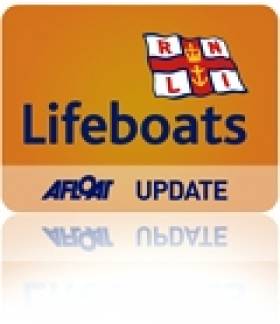Displaying items by tag: Hit The Surf
#RNLI - Portaferry RNLI is looking for new volunteer crew members to join its search and rescue service in Co Down.
The station currently has 17 lifeboat and two shore crew to cover its inshore service on Strangford Lough but is now calling on new volunteers to come forward and find out how they can get involved in helping the charity continue to save lives at sea.
To that end, the station will be hosting two open days early next month for all interested candidates to learn more.
"We are looking for anyone aged 17 years and over who is willing to offer some of their free time to join what I believe to be, one of the most exhilarating and rewarding voluntary services that is out there," said lifeboat operations manager Brian Bailie.
"Every volunteer receives first class training from the RNLI and learns new skills which can benefit them in many walks of life. Lifeboat crew members need to have a reasonable level of fitness, have good eyesight and not be colour-blind."
He added: "Anyone who would like to volunteer but feels they would not meet the requirements for lifeboat crew should in no way be put off, as shore crew also play an essential role in the launch and recovery of the lifeboat when it goes on service."
For anyone who feels they have the time and commitment to volunteer for the charity which is on call 24 hours a day, 365 days a year, is asked to email Brian at [email protected].
Alternatively, prospective volunteers can come along to the station’s open days from 7-9pm next Tuesday 7 May or from 2-4pm next Saturday 11 May.
Elsewhere in Northern Ireland, primary school children will have the opportunity to hit the surf with RNLI lifeguards over the next month.
The charity’s ‘Hit the Surf’ programme runs from 7 May to 7 June on the East Strand Beach in Portrush.
Aimed at primary five to seven pupils aged eight to 11, the programme - which is expanding to accommodate more schools this year - gives children a unique opportunity to gain practical lessons in lifesaving and beach safety. All equipment is provided free of charge.
Each session lasts two-and-a half-hours and includes a theory lesson on staying safe at the beach, the role of beach lifeguards and the RNLI, and detailed information on flags and rip currents.
There are practical lessons in lifesaving and surf based skills, while lifeguards aim to build pupils confidence in the sea. Children also learn about the local hazards and the beach environment.
Sessions are still available for schools who want to book pupils in. For more information contact Jessica on 0777 441 4208 or email [email protected]
Last year RNLI lifeguards located on beaches in Co Down and along the Causeway Coast responded to 158 incidents and assisted 176 people who found themselves in difficulty.
























































